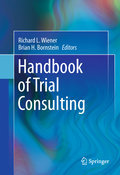
This volume will be a handbook that treats trial consulting as applied psychology. The purpose of the volume will be to collect the viewpoints of leaders in the field of psychology and law who apply the discipline’s theoretical models, methods, and ethics to assist litigators to try cases in the most effectiveway possible. As a whole, the collection of chapters will describe the theory, business, and mechanics of trial consulting for those interested in learningand practicing the profession. However, it will do so from the perspective oforganized theories of jury-decision making. In other words, the work of jurorresearchers will inform the recommendations and suggestions in the handbook. The volume consists of six sections, each pertaining to a different topic. Multiple chapters with different authors will cover each topic. The topics and corresponding seven sections will be 1) An Introduction to the Theory and Psychology of Jury Decision-Making, 2) Applied Research Methodologies for Trial Consultants, 3) Education and Ethical Considerations for Trial Consultants, 4) Preparing and Cross Examining Witnesses, 5) Technology and Demonstrative Evidenceat Trial, and 6) Special Topics in Trial Consulting. Each section will begin with the editors’ short introduction reviewing that section and explaining itsgoals, objectives, and content. Separate individuals, recognized as leaders in their areas will write the remaining chapters in each section. These individuals come from the fields of both psychology and law, and represent viewpointson these topics from a practice-oriented perspective, but a perspective that is emerges from research results. They are affiliated with a number of academic institutions, including University of Nebraska, John Jay College of CriminalJustice, University of Texas, University of Chicago Simon Fraser University, and private law firms. Provides an interdisciplinary perspective Contributors are prominent legalscholars and social scientists Covers often overlooked problems INDICE: An Overview and General Model of Juror and Jury Decision-Making. The Story Model Theory of Jury Decision Making. Statistical Models of Jury Decision Making. Focus Groups. Systematic Jury Selection. Persuasion and Argument Development. Mock Trial Research. Survey Research. Training and Education. Ethical Issues. Professional Issues. Reform Movements. Lawyers View of Trial Consulting. Judge’s View of Trial Consulting. Eyewitness identification and lineups. Admissibility of Expert Witness Testimony. Witness Preparation. Selecting Experts. Technology and Trial Consulting. The Use of Demonstrative Evidence. Technology II : The Role of the Trial Consultant. Psychopathy. Discrimination. Change of Venue and Pretrial Publicity. Assessment of Damages I: Mental and Social Health. Assessment of Damages II: Neuropsychological Concerns. Decision Making about Damages. Jury Instructions. The Future of Trial Consulting.
- ISBN: 978-1-4419-7568-3
- Editorial: Springer US
- Encuadernacion: Cartoné
- Páginas: 409
- Fecha Publicación: 08/05/2011
- Nº Volúmenes: 1
- Idioma: Inglés
